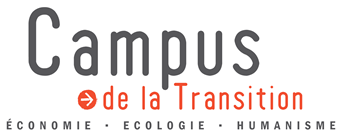The Campus de la Transition is not only a place of academic and professional training, but also a laboratory for academic research and action research focused on experimentation.
A laboratory for simultaneous research and experimentation
Teaching and research themes
The Campus’ research themes are intrinsically connected to critical transition issues. Concrete transition projects are conducted and thoroughly documented on the territory of Forges in Seine-et-Marne where the Campus de la Transition is based.
- Micro: corporate social responsibility, ethics and politics, ecological accounting, sustainable finance.
- Meso: study of social and ecological movements, territorial dynamics, alternative indicators of performance and prosperity; impact measurements.
- Macro: economic modeling, transnational law, UN sustainable development goals (SDGs), transition economy, circular economy, relational economy, resilience…
- “Forges in Transition” action-research: building and energy, sustainable and inclusive mobility, carbon neutrality, resource-efficient and resilient technologies.
- Transversal fields: ecological thinking, political philosophy, innovative pedagogical approach, environmental sciences, ethics and spiritualities.
An action oriented research approach
- An expertise pole in transition studies with international researchers in residence for a few weeks to a year
- Action-research and consultancy programmes, in partnership with companies, local stakeholders and other academic institutions
- Strategic monitoring on the social-economic aspects of ecological transition, as a resource for academia and business
The “CODEV – Companies & Development” programme, of the Essec Iréné institute
Expert in the ethical responsibility of multinationals, the co-founder and president of the Campus, Cécile Renouard directs the research programme « CODEV – Entreprises et développement », with the ESSEC Iréné institute. The programme evaluates the societal performance of companies, notably Total in Nigeria, Rio-Tinto Alcan in Ghana, Veolia in India, Danone in Indonesia and Mexico.
To measure the ethical responsibility of companies, the research team has constructed a “relational capacity” indicator that measures the quality of the social fabric based on the capacity approach developed by Amartya Sen and Martha Nussbaum.
The Campus de la Transition builds upon this methodological and scientific tool at the local level: on its grounds and in its regional context of the Pays de Montereau.
Established collaborations
As an institution working for the social and ecological transition of society, the Campus de la Transition collaborates with other academic, research and civil institutions that share our values and objectives:
Academic institutions and research
- CY Cergy Paris University
- LIED (University of Paris)
- CODEV-IRENE (ESSEC Business School)
- Centrale Supélec
- Ecole des Mines de Paris
- ICAM
- Centre Sèvres – Jesuit Faculties of Paris
- National Foundation for Business Management Education (FNEGE)
- Schumacher College, (Totnes, Great Britain)
- University of Montpellier – MUSE
Civil society, enterprises and public institutions
- MESRI
- Michelin Foundation
- Ademe
- French Development Agency
- Colibris Movement and Oasis Cooperative
- Community of Municipalities of the Pays de Montereau
- Amar y Servir Foundation
- Heritage Foundation
- Île-de-France Region
Scientific publications
The results of the scientific work carried out by the lecturer-researchers of the ecosystem of the Campus de la Transition are regularly published in scientific journals and books.
Below is a selection of recent publications:
“Le Manuel de la Grande Transition”, Campus de la Transition, Cécile Renouard, Rémi Beau, Christophe Goupil et Christian Koenig (sous la dir.), Editions Les Liens qui Libèrent, October 2020.
Resulting from the theoretical and practical reflection of more than 70 teacher-researchers, “The Handbook of the Great Transition” is a concrete tool for building a base of knowledge, skills and life skills necessary for ecological and social transition.
“L’enseignement et la formation dans la transition écologique et sociétale”, section coordinated by Cécile Renouard and Rémi Beau, Responsabilité et Environnement, A serie of Annales des Mines, n°101, janvier 2021.
Articles about the Campus de la Transition project:
Xavier de Bénazé and Cécile Renouard, « La conversion écologique », Etudes, Novembre 2020, p.47-58.
Cécile Renouard, “Pour une transition écologique: des expériences qui conduisent à des communs”, Revue d’éthique et de théologie morale, March 2020 (n° 305), p.59-71.
Cécile Renouard, « Une éducation supérieure radicale et non marginale ? L’expérience naissante du Campus de la Transition, in J-P Pierron et N. Wallenhorst (dir.), Eduquer en anthropocène, Le bord de l’eau, 2019, p.175-191.
Books
“Une monnaie écologique”, Alain Grandjean and Nicolas Dufrêne, Editions Odile Jacob, 2020.
“L’entreprise comme commun. Au-delà de la RSE”, Swann Bommier et Cécile Renouard, Charles Léopold Mayer Editions, 2018.
“Osons la paix économique: de la pleine conscience au souci du bien commun”, Dominique Steiler, De Boeck, 2017.
“Le facteur 12. Pourquoi il faut plafonner les revenus”, Gaël Giraud et Cécile Renouard, Carnets Nord-Montparnasse Editions, 2012, second ed 2017.
“Reprendre le contrôle de la dette”, Lord Adair Turner (translated into French by Mireille Martini), L’Atelier Editions, 2017.
“Financer la transition énergétique”, Alain Grandjean et Mireille Martini, L’Atelier Editions, 2016
“L’entreprise au défi du climat”, Frédéric Baule, Xavier Becquey, Cécile Renouard Ivry, L’Atelier Editions, 2015.
“Ethique et entreprise”, Cécile Renouard, L’Atelier Editions, 2013, 2nd ed. paperback 2015.
“Vingt propositions pour réformer le capitalisme”, Gaël Giraud, Cécile Renouard (under the dir.), Flammarion, 2009, reissue 2012.
“Michaël Walzer ou l’art libéral du civisme”, Cécile Renouard, Temps Présent, 2010.
“Prévenir le stress au travail : de l’évaluation à l’intervention”, Dominique Steiler, Retz Editions, 2010.
“Éloge du bien-être au travail”, Dominique Steiler, John Sadowsky and Loïc Roche, Grenoble University Press, 2010.
“Un monde possible. Les acteurs privés face à l’injustice”, Cécile Renouard, Seuil, 2008.
“La Responsabilité éthique des multinationales”, Cécile Renouard, PUF, 2007 (published with the support of the CDC Institute for Research).
